Subscriber Benefit
As a subscriber you can listen to articles at work, in the car, or while you work out. Subscribe NowFriday marked a historic moment for the Indiana State Bar Association as the bar inducted its first president who is also concurrently a judge and heard from legal leaders from across the state about updates in the Indiana legal profession.
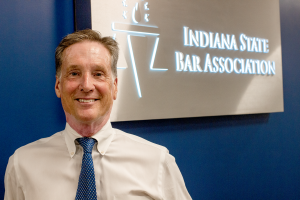
Senior Judge Thomas Felts took the helm as ISBA president from Richmond attorney Amy Noe Dudas during the bar’s Annual Summit in Indianapolis. Felts was inducted as president during Friday’s assembly meeting.
In her parting remarks, Dudas told the assembly, “I appreciate your confidence in allowing me to play a small part in the history of the ISBA. It has been my privilege.”

Dudas was honored at the meeting with the Distinguished Hoosier Award, presented by Court of Appeals of Indiana Judge Melissa May on behalf of Gov. Eric Holcomb.
“The majority of us, I think, go through life not being able to fully appreciate the people whose lives touched ours or the lives whose trajectory, however slightly, we might have influenced,” May said. “From the first time I met Amy, I knew she was going to be one of those people who made a difference in my life and in the lives of many others.”
Story continues below
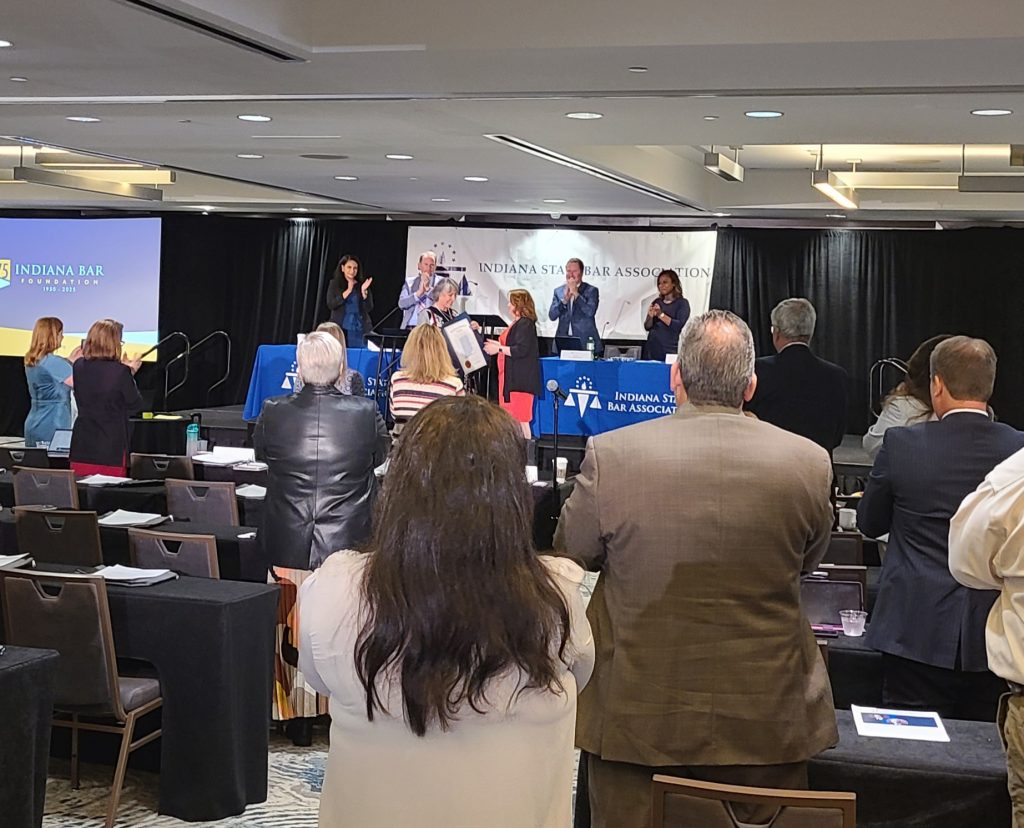
The assembly meeting also featured remarks from leaders of various legal organizations. That included Indiana Chief Justice Loretta Rush, who discussed the partnership between the bench and the bar association.
“It’s that relationship between the bench and bar that I think is sort of the defining feature of Indiana,” Rush said. “We have 18,753 active lawyers in the state, we have 600 judicial officers, and that sort of dance we do together is critical for the 6.7 million Hoosiers we serve.”
Rush highlighted several recent developments in the Indiana legal field, including changing how expungements are listed on MyCase and the continuing attorney shortage.
Indiana State Public defender Amy Karozos also discussed the attorney shortage and its specific impact on public defenders.

“What happened when we got in there and finally found attorneys for these people were, in some cases, they had been sitting for weeks without having counsel appointed,” Karozos told the assembly. “But in some cases, cases had been sitting for years, and so they had cycled through several public defenders as one quit and another one was appointed and started over again, and then they will quit. And so as you can see, the situation is something that’s not just in theory — it’s real out there.”
For his part, Michael Moore of the Indiana Public Defender Commission urged attendees to engage with state lawmakers.
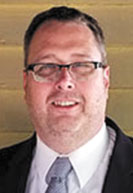
“The Legislature is considering modifying our state Constitution to hold people about safety concerns,” Moore said, referencing the efforts to change the Indiana Constitution to allow the denial of bail in some circumstances. “So this is an opportunity for a lawyer to speak up.”
In her address, Rush also discussed technological advancements, including artificial intelligence tools like ChatGPT, which was the subject of a separate presentation Friday.
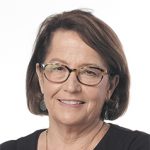
In the world of civil legal aid, Caryn Glawe provided an update from the Indiana Bar Foundation as chair of its board.
Glawe pointed to the foundation’s recent efforts to provide more than 100 self-help kiosks across the state for Hoosiers to use though a partnership with the Indiana Housing and Community Development Authority.
“The word of the year the Indiana Bar Foundation has been ‘kiosk,’” Glawe said.
Looking ahead, Glawe noted the foundation will celebrate its 75th anniversary in 2025. A gala has already been scheduled for Oct. 3 of that year.
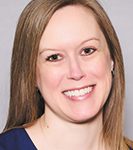
“This milestone anniversary will give us the opportunity to celebrate the Indiana legal community and all that we have been able to accomplish together through the foundation,” Glawe said.
Speaking on behalf of the Marion County Bar Association, President Amber Finley discussed events including those providing expungement assistance at Martin University, a legislative update and providing pro bono services to local Black-owned businesses.

“This year, the Marion County Bar Association has focused on increasing our community presence and impact, increasing membership, and increasing our fundraising efforts, all to ensure the sustainability of the organization for another 98 years,” Finley said.
Senior Judge G. Michael Witte, president of the Asian Pacific American Bar Association of Indiana, previewed next month’s National Asian Pacific American Bar Association Convention, which will be held in Indianapolis — although it almost wasn’t.
“There was a movement afoot to boycott Indiana, that Indiana is not friendly to people of color, that Indiana is not friendly to Asians, Latinos, Hispanics, LGBTQ, with a focus on legislative actions,” Witte said.
But the local chapter advocated for the city and prevailed.
“Our message to the forces within the NAPABA that were attempting this boycott was, ‘If you want to make a difference, you have to be there,’” Witte said.
The national convention will be held Nov. 9-12 at the JW Marriott. The organization will be celebrating its 35th anniversary.

Looking to 2024, Witte noted the annual Lunar New Year CLE, which in 2024 will mark the Year of the Dragon. That will be followed in May by an Asian American and Pacific Islander Heritage Month CLE, which will feature the documentary “A Long March” and an address from director TS Botkin.
At the end of the meeting, House of Delegates Chair Angka Hinshaw noted there weren’t any resolutions for the House to consider this year but said that gives them an opportunity to think about changes they can make next year.
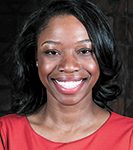
Hinshaw said next year’s meeting will be different.
“Rather than addressing whatever business may come before us, we will be proactive in choosing a topic or two that needs your input and perhaps some of the things that we’ve heard today or potential ideas. We will come together to problem-solve or … to bring in speakers and conduct brainstorming sessions to address these challenges together,” Hinshaw said.
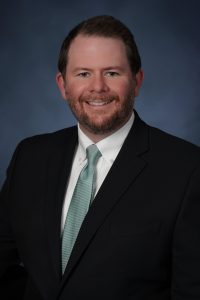
She ended the meeting by passing the gavel to the new chair, Séamus Boyce.
“It is critical for our profession and society that we collaborate and encourage our colleagues to come off the sidelines to join us in our work in traditions,” Boyce said.
Please enable JavaScript to view this content.

